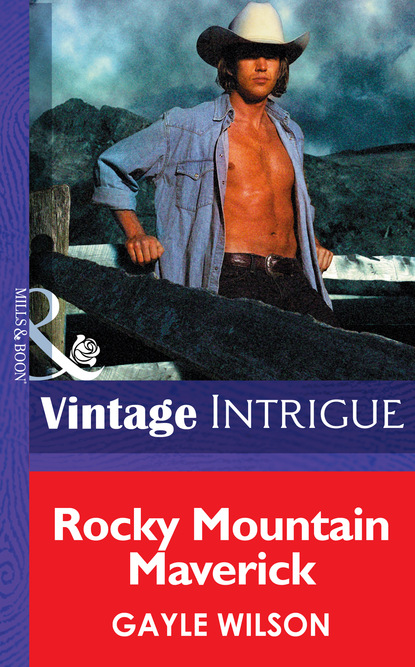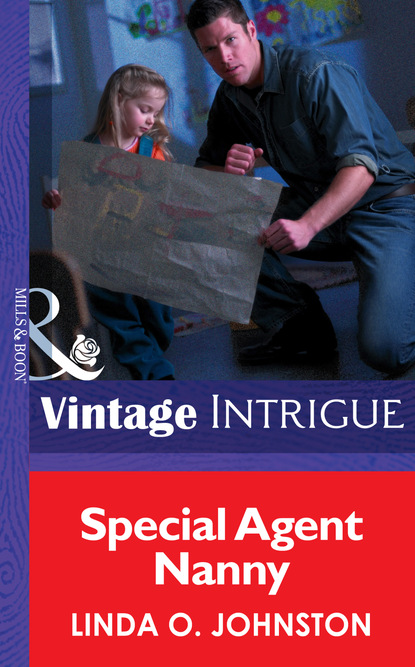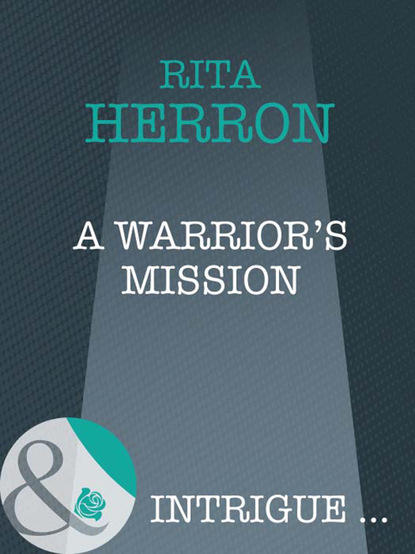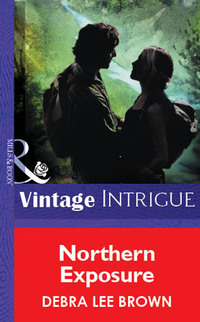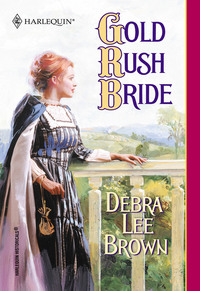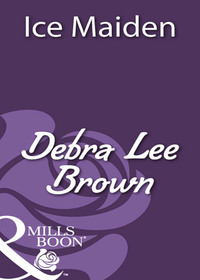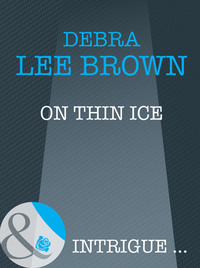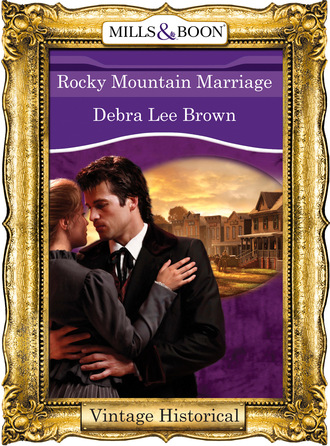
Полная версия
Rocky Mountain Marriage
She followed his gaze, then gasped, thunderstruck, as a hotel clerk snatched the Vacancy sign from the window.
“Told you they’d be full up. One of the big mines outside Fairplay struck a lode last month. Paid off today. The town’s crawling with miners who’ve got money to burn. Can’t say I didn’t warn you.”
She ignored him, marched up the steps to the hotel and threw herself on the mercy of the clerk. He had to find her a room. He just had to! Five minutes of pleading later, she was back on the street, fuming.
Chance leaned casually against the hitching post, his hat pushed back on his head, that irritating grin of his aimed right at her.
“I will not spend the night in that saloon.”
“You sure?”
“And I will not ride double with you on that horse.” It was out of the question. She never intended to be that close to him ever again.
“It’s either that or walk back. Silas doesn’t take to people, especially women. In fact, he’s downright ornery. Likely he’d buck you off if you tried to ride him solo.”
She eyed the horse. “He doesn’t look too terribly ominous. I’m sure I’ll manage.”
“So you will come back to the Flush with me.”
It appeared she had no choice, unless she wanted to sleep in the street. If she had to stay the night in a saloon, at least it would be her saloon and not one of the questionable-looking drinking establishments lining Last Call’s main street.
She approached the gelding and matter-of-factly untied him from the post. Silas looked at her, seemingly unconcerned. “I’m not with you, Mr. Wellesley. I’m simply borrowing your horse.”
“Whoa, wait a minute. I meant what I said about him not liking women. It’s too dangerous for you to—”
She ignored him and mounted without incident, then arranged her skirts as modestly as possible under the circumstances. Silas glanced back at her, waiting.
“Well I’ll be a—” He gawked, first at the horse, then at her.
“A what?” she said, casting him a smug expression. A number of nouns, all of them improper, came to mind.
He smiled suddenly, his gaze heating with the same underlying carnality he’d exhibited in the saloon. She swayed a bit on the horse.
“Come on,” he said, and took Silas’s reins from her hand. “I’ll lead.”
Chapter Two
C hance Wellesley knew a sure bet when he saw one.
He sat in the window seat of the upstairs room he rented at the Royal Flush and, through a pair of opera glasses he’d won off a Denver politician in a poker game, watched Miss Eudora Elizabeth Fitzpatrick scribbling madly into what he’d thought last night was a bible.
“Well I’ll be damned. It’s a diary!”
He would have given his last plug nickel to know what she was writing in it.
She’d made quite the commotion when they’d returned to the saloon last night. Delilah had tried to set her up in her father’s old room, but the intractable Miss Fitzpatrick would have none of it. He laughed, recalling the look of horror on her face when Delilah had suggested it.
In the end, a few of the girls fixed up one of the cabins out back for her, and there she’d passed the night. He’d been up since dawn, waiting to see what she’d do next. Everybody knew schoolteachers rose early, and Wild Bill’s daughter proved to be no exception.
She sat at the desk under the cabin’s single window, her back straight as a washboard, her lips pressed into a tight line, penning God knows what into that little red book of hers. In the morning light she looked different than she had last night. Younger, softer, almost pretty.
He ran a hand over his beard stubble, then took a swig of hot coffee to clear his head. “You’re seeing things, Wellesley.”
After wiping the lenses of the opera glasses with his handkerchief, he looked at her again. Nope. Nothing different, after all. Just a trick of the morning light. She had the same dishwater-blond hair, pale skin and wore the ugliest gray dress he’d ever seen.
Not that it mattered. She was a woman, and women generally liked him. He didn’t have to like her. He’d made a bad start of things last night. Today he’d do better. By sundown she’d be mooning over him, and he’d know everything he needed to know about what her father might have told her before he died.
He’d spent six long months at the Royal Flush, watching and waiting for Wild Bill to make a slip. He’d come too far to quit now. Maybe his daughter knew something the rest of the folks around here didn’t.
Maybe she knew where the money was.
Dora capped her fountain pen and sighed. She’d spent a sleepless night on a lumpy mattress huddled under a pile of musty blankets. The potbelly stove had gone out in the middle of the night, and when she’d gotten up to relight it she realized she had no matchsticks. This morning she’d found an old flint on the floor near the coal bin and in no time was toasty warm again.
“Now, one last thing…” She slid her father’s final letter to her out of her diary and carefully reread every word.
The small brass key that had accompanied it was still tucked safely away in her pocket. She fished it out and held it up to the sunlight streaming through the window. It had an odd marking on it, one she couldn’t decipher. She was certain the key fit something, but what? Nowhere in the letter had her father mentioned it. Why would he send her a key and not tell her what it opened?
She had to admit, the enigma sparked her curiosity and appealed to her intellect. In secret, the past few months she’d been reading mystery novels in her room at night. Her mother, God rest her soul, would have been shocked had she known.
Dora had begun her diary shortly after discovering her father’s letters to her. In it she wrote her most private feelings and thoughts, in addition to faithfully recording her observations regarding any unusual events. She’d learned something from those mystery novels, after all.
Her journey to Last Call and the Royal Flush counted as perhaps the most unusual event of her life, and so she’d decided to record everything, including descriptions of the people she met. She’d wasted half a dozen pages this morning on Chance Wellesley alone. Perhaps now she could banish him from her mind.
She returned her thoughts to the letter and read the most cryptic paragraph again.
I know I haven’t been much of a father to you, Dora, but rest assured, your financial future is secure. I’ve left you something at the ranch. Something only you, seeing as how smart you are, will recognize. It’s the Chance of a lifetime, Dora. Take it.
She held the key up to the sunlight and studied it closely. “The chance of a lifetime.” Whatever did he mean? As she pondered her father’s parting words, her eyes refocused on an upstairs window of the house.
She gasped and dropped the key.
Chance Wellesley dropped his opera glasses. The insufferable man was spying on her!
He made it to the bottom of the spiral staircase a second before she burst through the kitchen into the saloon.
“How dare you!”
“Coffee?” he said, motioning toward the bar, where the bartender was pouring himself a cup. “I don’t mean to be rude, but you look like you could use it.”
“You were watching me from that window.”
There it was again, that trick of the light. She was pretty when she was mad, despite the ugly dress. Her eyes were gunmetal gray, he noticed for the first time, and flashed him a murderous look in response to his smile.
“Explain yourself.”
He shrugged. “I can’t. Guilty as charged.”
“So you admit you were watching me?”
“I do. Now, how about that coffee? I know I could use another cup.”
She took stock of her surroundings, as if she’d just now realized she was standing in the saloon. It wasn’t much to see this time of the morning. Delilah and the girls were still asleep, and the bar didn’t usually open until ten, not until two on Sundays. Wild Bill had had standards, after all. For regulars like himself it was different, of course.
“Miss Fitzpatrick?” The bartender held out a cup to her. “Could rustle you up some breakfast if you like.”
“No, I, um…” She calmed herself down—for the bartender’s benefit, not his, he presumed. “Yes, a cup of coffee would be wonderful.” She walked up to the bar and he set the cup down in front of her. “Thank you.”
“My pleasure. Cream?”
“Yes, please. And sugar, if you have it.”
“Comin’ right up.”
Chance watched her as she fixed her coffee, doing the best she could to ignore him.
“I don’t think we were properly introduced last night. You are…?”
“James Parker, ma’am. But you can just call me Jim. We’re pretty informal around here.”
“Jim, then.” She nodded, looking past him along the bar, which hadn’t been wiped down from last night, to the pile of dirty glasses in the sink. The floor was littered with cigar butts and sticky with spilled beer.
“Oh, I, uh…” Jim cast her a sheepish look. “I meant to get this mess cleared up last night, but you know how it is.”
She wasn’t listening to him. Chance followed her gaze to the portrait above the bar. Her pale cheeks flushed the most disarming shade of scarlet he’d ever seen.
“Something wrong?” he asked.
She instantly averted her eyes. “Yes. No. I’m perfectly fine.”
He hadn’t been up long, and while he was wearing trousers and boots, his shirt was only half buttoned. Her gaze drifted to the opening, lingering on his chest hair. He knew she’d come around. They always did.
Their eyes met, and true to form she blushed hotter and turned her attention back to her coffee. He was beginning to enjoy this.
“Don’t like that painting much, do you?”
“No. No, I don’t.”
“Well, it’s your place now. You could always take it down.”
“Take it down?” Jim, who was hastily wiping the bar down, froze in midstroke.
“That won’t be necessary. I told you. I’m selling the place as soon as possible.”
“Selling it?” Jim had worked at the Flush since Wild Bill opened the place. He didn’t look happy about the prospect of losing his job.
“Yes. In fact, I’m going into town this morning to see a lawyer.”
“But, uh, Miss Fitzpatrick…” Jim ran a hand over his balding head, then toyed nervously with the ends of his moustache. “Your pa wouldn’t have wanted you to sell the place. Not right away, at least.”
“I’ve been meaning to ask someone.” She drew herself up in what Chance was beginning to think of as her schoolteacher pose, and said, “How did my father die?”
“You mean you don’t know?” Jim tossed him one of those you-tell-her looks.
“He was shot,” Chance said. “Right here in this very room.”
She sucked in a breath, and from the stunned look in her eyes he knew her surprise was real and not fabricated.
“W-who did it?”
“Nobody knows.” But he was going to find out, if it was the last thing he did. “It was a Saturday night. The saloon was packed. We heard the shot, and he just went down.”
“Right here,” Jim said, nodding at the floor behind the bar.
“You were here? Both of you?”
“Sitting right over there, playing cards.” He cocked his head toward one of the tables.
“I dropped a tray of beer mugs in the doorway there.” Jim nodded toward the kitchen. “Glass everywhere.” He shook his head. “Damned shame.”
“Excuse me?”
“About your pa, I mean, not the glass.”
“Oh, of course.” She stared past Jim at the dark stain on the well-worn pine flooring behind him, where William Fitzpatrick’s blood had soaked the unvarnished wood.
Chance caught himself feeling sorry for her. He downed the rest of his coffee and adjusted his attitude. He had a job to do, and it was time to get some answers. “Your father, uh, write you any letters before he died?”
She snapped to attention, her spine straightening, and cast him a suspicious look. “Why do you ask?”
“No reason.” He shrugged convincingly.
Not ten minutes ago he’d watched her read a two-page letter he’d mistaken last night for prayer sheets. His first erroneous impression of her and that red leather-bound book had cost him time. No matter, he thought as he noticed the diary and the letter sandwiched inside it poking out from the pocket of her dress. He’d get his hands on it soon enough.
Jim leaned toward her in his bartender-like “you can trust me” slouch, which Chance had seen him use with great success in wheedling information out of the most secretive of customers. “Your pa didn’t, uh, mention that he’d left you anything special here, did he?”
Chance went statue-still.
“What do you mean? Left me what?”
Jim looked at him, but Chance didn’t come to his rescue this time. He was busy viewing Jim Parker with new eyes.
“Well, uh, anything. Important papers, family keepsakes…” Jim ran a sweaty palm over his balding pate. “…valuables, maybe?”
“Valuables? You mean like jewelry or money?” Her frown deepened. She looked around the room again, this time with renewed interest.
“Oh, uh…” Jim looked away. He grabbed a wet towel and began wiping down the bar. Chance had never seen him so agitated. “Was just a rumor I heard, is all.”
Chance watched her closely to see if her gaze lingered too long on any one area of the saloon. It didn’t. “I suspect Miss Fitzpatrick doesn’t much believe in rumors.”
“You’re right,” she said curtly, avoiding his eyes. “I don’t. I base all my decisions on facts.”
She tried to mask her natural reaction to the painting over the bar when her gaze darted past it, but couldn’t. He smiled inwardly. Her prudish sensibilities were predictable, and that would make his job all the easier.
Eventually she dropped her gaze to the letter sticking out of her diary. He could tell by the twitch of her hand against her pocket that she fought the urge to take it out and read it again in front of them.
He had to know what was in that letter.
She caught him staring at it, and abruptly turned away.
“Well,” she said to Jim. “I’ll be going into town now, Mr. Parker. Is there a buggy or some other kind of conveyance I might borrow?”
“The place is yours, Miss Fitzpatrick. Take whatever, uh…conveyance you like.” He nodded in the direction of the kitchen door. “One of the boys out back will set you up.”
“I could take you in,” Chance said and risked a smile.
She arched a disapproving brow at him as if he’d suggested they run buck-naked together down to the creek and jump in. Hmm. He gave her dowdily clothed figure another once-over and thought the notion wasn’t a half bad idea.
Her nostrils flared. “That won’t be necessary.” She turned away. “Thank you again, Mr.—”
“Jim,” the bartender said.
“Jim, then.” She dropped a smile on him, and after a cautionary glance in Chance’s direction, she turned on her heel and marched out the way she’d come in.
Chance set his empty cup down on the bar and figured he had just enough time to finish dressing, grab his hat and saddle up Silas before she was gone.
“You’re not really thinking of selling the place, are you?” Jim called after her.
Wild Bill’s daughter didn’t answer.
For the second time in as many days Chance Wellesley followed her to town. Dora didn’t give him the satisfaction of looking back at him. Not once. Well, maybe once, but that had been a mistake. Her hat had flown off in a gust of wind, and she’d stopped to retrieve it a second before he caught up with her. He’d tipped his hat to her and smiled. She’d promptly ignored him.
As it turned out, her father had owned a number of good horses, a sound buckboard, a surrey and two wagons used for hauling loads of supplies from town. Rowdy, one of two ranch hands whom he’d continued to employ long after he’d quit the cattle business, had, true to the bartender’s word, set her up. She’d opted for the buckboard.
Guiding a pair of dappled mares, she pulled off the deeply rutted trail leading from the Royal Flush onto Last Call’s main street. It was a fine spring day, and the town looked far more welcoming in the sunshine than it had last night.
Out of the corner of her eye she spied Chance making the turn into town behind her, Silas dutifully trotting along in her wake. Why wouldn’t the man leave her alone? She was determined not to encourage him. She’d seen the way he’d looked at her in the saloon, and the suspicious way he’d eyed her diary. She’d simply have to ignore him.
Last Call was a fair size for a mining town. In addition to the establishments she’d already seen, the long boardwalk-lined main street boasted a mercantile, telegraph office, the livery where yesterday afternoon she’d hired transportation out to the ranch, a cattle exchange, grange building and a small, whitewashed church.
No school, at least not here in the center of town. Perhaps it was tucked away on one of the side streets among the residential buildings and boardinghouses. Boardinghouses that were full up, she remembered with irritation. Then again, perhaps Last Call had no school. She noticed a number of children playing in the street, children who should be in school on a Friday morning.
“The sign says Harrington, but his name’s Grimmer.”
“Excuse me?” She hadn’t noticed that Chance had spurred Silas up alongside her.
“Your father’s lawyer.” He flashed his eyes at the sign as she pulled the buckboard up in front of the law office she’d seen last night.
“How would you know my father’s lawyer?” He seemed determined to insinuate himself into her business. The question in her mind was why?
Had her father left her something more than the saloon and ranch, as both his letter and Jim the bartender had implied? He very well might have, and if Chance Wellesley knew about it, he was exactly the kind of unscrupulous character who would attempt to swindle her out of whatever it was. Perhaps it was money. Hmm…
He dismounted and was at her side a moment later, his hand extended to help her down from the buckboard. He flashed her that trademark smile, and it dawned on her that he meant to seduce her out of it, if money was indeed his motive in dogging her every step.
“Oh, Chance! Yoo-hoo,” a coquettish voice sounded from behind her.
She turned to look at the passerby, a surprisingly well-dressed woman, and Chance used her momentary lapse in attention—and judgment—to grasp her around the waist. “Oh!”
“Just helping you down, Miss Eudora.”
“It’s Dora. I mean—” The man completely discombobulated her! “Take your hands off me! I’m perfectly capable of—”
He ignored her protest and lifted her from the conveyance, setting her, light as you please, on the ground. “You’ve overstepped your bounds, Mr. Wellesley.”
The well-dressed woman winked at her as she passed them. “He’s been known to do that a time or two, haven’t you, Chance?”
He shrugged boyishly, angering her even more.
Dora stormed past them both, climbed the two steps up to the boardwalk, and a few seconds later opened the door to the law office of H. J. Harrington, Esquire.
“Mortimer Grimmer,” the friendly-looking man said to her, extending his hand. “How may I be of help?”
“Told you his name was Grimmer.” To her annoyance, Chance had followed her into the office.
“Wellesley! What brings you to town?”
Chance grinned. “I’m here to collect the rest of my winnings from Saturday night’s game.”
Dora was appalled. Not only did he know her father’s lawyer, it appeared they played cards together.
“Oh, and I’d like you to meet someone. Miss Eudora Elizabeth Fitzpatrick.” She was surprised he remembered her middle name.
“You’re Bill’s girl?” Mr. Grimmer grabbed her hand and shook it enthusiastically. “Well, I’ll be. You don’t much look like him.”
She barely remembered what her father had looked like, so she didn’t know whether he was complimenting her or not. She knew she wasn’t much to look at, but the good-natured lawyer was smiling, so she suspected it was a compliment.
“I take after my mother’s side.”
“Well, well. Please, have a seat.” He gestured to a visitor’s chair in front of his very tidy desk. Business didn’t appear to be too brisk. “You, too, Chance.”
“Oh, but…” She wasn’t about to talk about her father’s affairs with him in the room.
Grimmer read her reaction. “Oh, I apologize. I thought you two were together.”
“We are,” Chance said.
“We most certainly are not.” She refused to sit down until he left Mr. Grimmer’s office. Once that was made clear, and after he had, she got down to business.
“Now, about your father’s will…” Grimmer produced the will, and together they reviewed it. It confirmed what he’d written in his telegram to her last month, that out of her father’s original thirty thousand acres, only six thousand remained. He’d sold the rest to finance the construction of the house and set himself up in business.
During their conversation she was aware of Chance standing outside on the boardwalk, leaning up against the side of the building, pretending not to watch them. She knew better. The nerve of the man!
“Well, that’s that, then.” Grimmer handed her his bill. It was sizable. He appeared to be waiting for her to pay him. She suspected he needed the cash to pay off the gambling debt he owed Chance Wellesley.
“There was nothing in particular described in my father’s will besides the property?”
“That’s right,” Grimmer said. “And all the contents, of course, the livestock, the horses, et cetera. The transfer papers are all complete.” He produced them, and after reviewing them she signed them.
“Yes, but I had thought he might have left me something more. Something…”
The lawyer clasped his hands together on top of his desk and leaned forward in anticipation. His paternal smile faded. For a moment he reminded her chillingly of the greedy mole in a popular children’s book she read to her younger students.
“Never mind,” she said, and shook off the odd feeling.
His smile returned.
She took a moment to collect her thoughts, then rose. “Thank you, Mr. Grimmer. You’ve been most helpful.” They shook hands, and when it became apparent to him that she wasn’t going to pay him his fee, she said, “As soon as I’m done at the bank, I’ll see to it you get your payment.”
His smile broadened. “Have a fine day, Miss Fitzpatrick.”
“Goodbye.”
Chance was waiting for her outside, casually twirling the watch fob hanging from his belt, trying to appear indifferent. He didn’t fool her for a second.
“You’re still here,” she said as she breezed past him, continuing down the boardwalk toward the bank. She paused to read a handbill warning the public about a rash of counterfeit currency in circulation right here in Park County.
Chance beat her to the door of the bank and held it open for her as she entered. There were several customers in line waiting to speak with a clerk who was carefully inspecting each bill of a customer’s cash deposit.
A tall, impeccably dressed gentleman who was likely the bank’s manager appeared from an office in the back to offer help. He was fair-haired and clean-shaven, rather dashing, Dora thought.
“I wouldn’t get my hopes up if I were you.” Chance removed his hat and stepped into line behind her.
She promptly turned her back on him. “I’m sure I don’t know what you mean, Mr. Wellesley.”
The portly woman in front of her reeked of lavender water and struggled to keep her noisy little dog under control. Any moment Dora was going to sneeze. She opened her reticule and fished around for her handkerchief, retrieving it just in time.
“What I mean, Miss Fitzpatrick—”
The banker looked up at the mention of her name. He had the most captivating blue eyes.
“—is that Wild Bill didn’t think much of banks. So if you’re expecting to find—”
She sneezed so violently she dropped her open reticule. Its contents spilled out across the floor.


